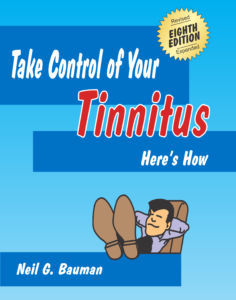by Neil Bauman, Ph.D.
 New 8th Edition!
New 8th Edition!
If your ears ring, buzz, chirp, hiss, click or roar, you know just how annoying tinnitus can be. The good news is that you do not have to put up with this racket for the rest of your life. You can take control of your tinnitus.
Recent studies show that a lot of what we thought we knew about tinnitus is not true. Exciting new research reveals a number of things you can do to eliminate or greatly reduce the severity of your tinnitus so that it no longer bothers you. This totally-revised, up-to-date and greatly-expanded 8th edition contains the very latest in tinnitus knowledge, research and treatment.
To make it easy to find the information you want, this book is divided into four parts:
- What is tinnitus?
- What Causes Tinnitus?
- Things you can do to take control of your tinnitus.
- Resources for Tinnitus including sources of help, tinnitus evaluation questionnaires and a comprehensive listing of more than 990 generic drugs and more than1,530 brand name drugs that are associated with tinnitus.
In this new edition you’ll learn why there will never be a single drug or treatment for tinnitus. Rather, you’ll discover that there are three basic types, and several sub-types of tinnitus. For good results you need to match the appropriate treatment to your specific type of tinnitus. This edition helps you to match your kind of tinnitus to the best treatments for that type of tinnitus.
Printed softcover book, 8th edition, 684 pages ($39.95)
Downloadable eBook in pdf format, 8th edition, 660 pages ($29.95)
Reviews:
“Your book, ‘When Your Ears Ring’ [now ‘Take Control of Your Tinnitus’] is the best that I’ve read and the easiest to understand. It is so complete. You bring up virtually all facets of tinnitus. Thanks!”—R. S.
“I just recently read your tinnitus book, and you are right—just simply by reading it has activated TRT [Tinnitus Retraining Therapy] for me. I already notice a reduction in my tinnitus by about 50% or more. Just by viewing tinnitus as a challenge, attaching no fear or emotion to it—and when I do hear it, I just say ‘oh the gentle breeze is back’—I believe the habituation process is already starting to happen.”—M. W.